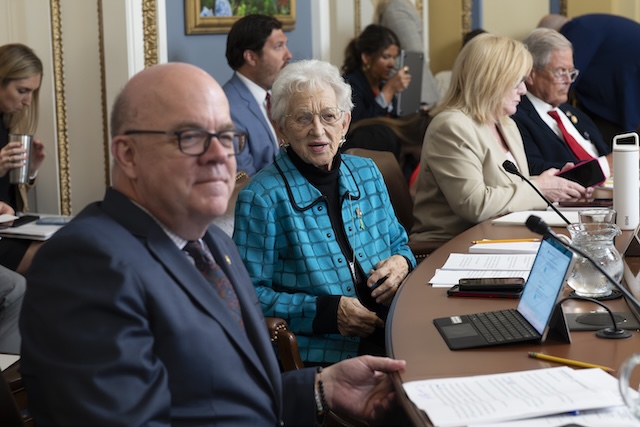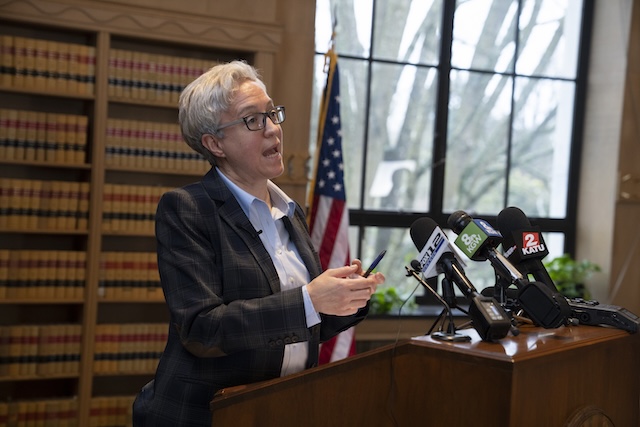Guest column: Oregon should help bring term limits to Congress
Published 12:35 pm Wednesday, July 2, 2025

- House Rules Committee Chairwoman Virginia Foxx, R-N.C., center, is joined by Rep. Jim McGovern, D-Mass., left, as they prepare President Donald Trump's signature bill of big tax breaks and spending cuts to go to the House floor on July 1. (AP Photo/J. Scott Applewhite)
Washington, D.C. has become a place where power calcifies. Elections often hinge on name recognition and incumbency, while policymaking is increasingly influenced by donors, special interests, and partisan gridlock. This isn’t how democracy is supposed to work—and it’s why we, especially in Oregon, should demand congressional term limits.
Support for term limits is overwhelming. More than 80% of Americans — across party lines — favor them. The idea is simple: new lawmakers bring fresh energy and are more likely to challenge entrenched systems, stay connected to constituents, and resist capture by powerful interests.
Oregon has long led the nation in democratic innovation. We pioneered vote-by-mail and were first to implement automatic voter registration. Now it’s time to lead again—by joining the growing number of states pushing for a constitutional amendment to impose term limits on Congress.
The problem with career politicians
The longer lawmakers stay in office, the less accountable they become. Many grow disconnected from their constituents and more tied to D.C.’s political machinery. Power in Congress is based on seniority, not merit—committee chairs are awarded by tenure, often sidelining newer voices with fresh ideas.
This stagnation is reinforced by a growing generational gap. The average age in the U.S. Senate is over 64; in the House, it’s over 57. While experience matters, older lawmakers often struggle to grasp pressing issues like climate change, housing affordability, and digital privacy. This disconnect is a real obstacle to responsive, forward-thinking governance.
Why Congress won’t fix itself
Congress has had numerous chances to impose term limits—and has ignored them every time. Many members treat their seats as lifetime entitlements, with no real incentive to limit their own power.
That’s where Article V of the U.S. Constitution comes in. It allows states to call a constitutional convention if two-thirds of legislatures (34 states) agree. Importantly, the call can be limited to one issue—in this case, congressional term limits.
This isn’t just theoretical. Twelve states have already passed resolutions calling for a term-limits-only convention. Oregon should be next. Doing so would not only honor the will of voters but also strengthen the national movement to break the cycle of entrenched incumbency.
What term limits could accomplish
Critics argue that term limits would weaken Congress by reducing experience and empowering unelected insiders. But experience from states with legislative term limits — like California and Michigan — suggests otherwise. Term-limited lawmakers tend to be more engaged with constituents and less beholden to campaign funders.
Term limits would also reduce careerism, break the grip of long-serving committee chairs, and open the door to more diverse and representative leadership. Oregon, with its history of reform, would benefit from a deeper bench of emerging leaders in Congress.
Perhaps most importantly, term limits could cool the toxic partisanship gripping our national politics. When lawmakers aren’t fixated on reelection, they’re more likely to focus on legacy — and that encourages bipartisan problem-solving on issues that matter, including cost of living, healthcare, climate action, rural broadband, and public lands.
Oregon can lead again
The Article V process empowers states to act when Congress won’t. Oregon’s legislature now has a chance to join a historic effort to restore accountability and vitality to our federal government.
We’ve led on reform before. We’ve prioritized access, transparency, and accountability. It’s time to do so again — by championing congressional term limits.
Let’s put principle over politics and remind the country that Oregon believes in a government of, by, and for the people — not just those who’ve held office since the Cold War.
Congress won’t change itself. It’s up to us.
Andrew Kalloch is Oregon state co-chair for U.S. Term Limits.








